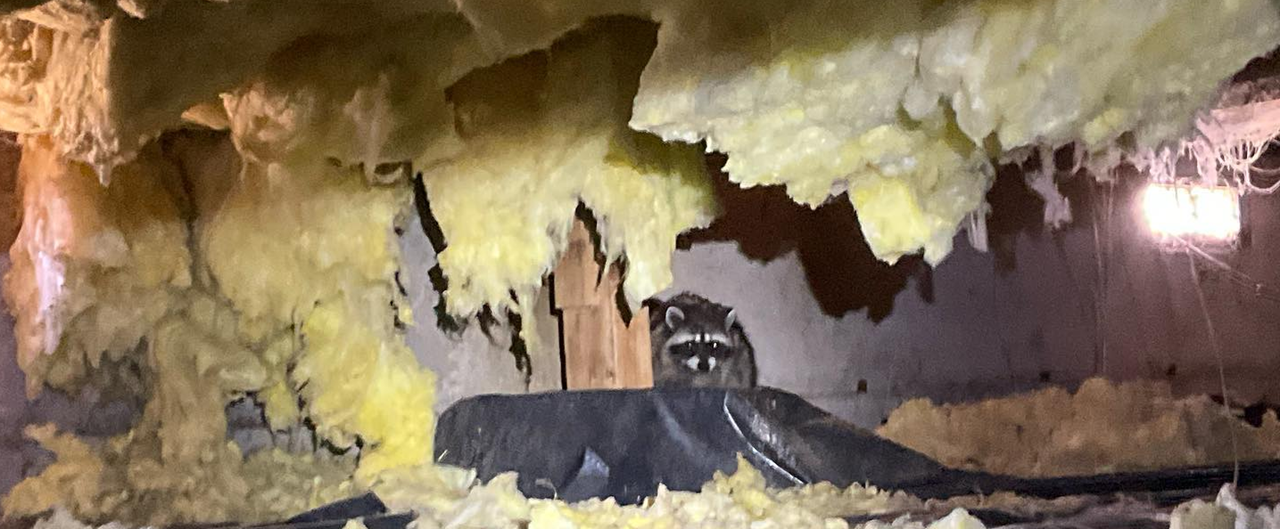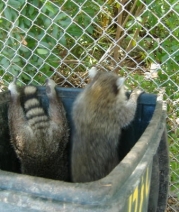
Table of Contents
- Raccoons in the House
- Raccoons in Attics
- Raccoons in the Chimneys
- Raccoons in Walls
- Raccoons in Basements
- Raccoons in Crawl Spaces
- Raccoons in Trash
- Raccoons on Roof
How to Get Raccoons Out of Trash Cans
Raccoons have several attributes that make them fascinating and intimidating. They are highly intelligent, clever, and curious. When searching for food, their nimble hands allow them access to food you think is secure in a trash can. Raccoons are agile and can climb almost any surface. While they struggle to climb smooth, vertical structures, they are smart enough to find other ways to access the inside of a trash can.
Raccoons are typically nocturnal and scavenge for food at night. However, you will see raccoons in trash cans or elsewhere during the day if they can find food for themselves or their young. Seeing a raccoon during daylight does not always mean it is sick or rabid, but you must still avoid them. The best thing you can do is learn how to keep raccoons out of trash cans altogether.

Signs of Raccoons in Your Trash
Raccoons are not tidy thieves. They rummage through trash and scatter it all around the area. If food is in a can, they remove the lid and search for anything edible. If the food is in a plastic garbage bag, expect to see all the contents on your lawn or street.
Near every trash can or bag are specific signs of raccoon activity. Look for tracks, five fingers, and five toes with small claws. Raccoons like to dig holes in lawns and scratch marks on anything they are trying to open or climb. Their fur is filthy, and whatever it presses against will be left with a greasy smudge mark. Raccoon scat is easy to identify. They can measure up to an inch in diameter and up to three inches long.
Raccoons are excellent swimmers. If you have a swimming pool on your property, they will likely take time to enjoy the water.
What Do Raccoons Eat?
Raccoons are omnivores, eating a wide variety of foods. In the wild, raccoons eat nuts, fruits, and grains. When scavenging in a residential area, they eat pet and livestock feed, birdseed from bird feeders, table scraps and leftovers, garden crops, insects, and fish from small ponds.
If you have a chicken coop, raccoons will try to capture them. They will also eat chicken and bird eggs when they can. Other foods in a raccoon’s diet include small birds, snakes, frogs, mice, bark with sap, and grasses.
Risks of Raccoons in Trash Cans
Raccoons need food, water, and shelter for survival. Wherever they find food, they will build a den nearby. Raccoons may travel up to ten miles foraging for food, creating multiple dens along their path. If your attic, porch, shed, crawlspace, roof, or basement is accessible, they will use it as shelter.
Raccoons damage siding, soffits, and gutters when climbing onto your roof. They break shingles, vents, and chimney covers. They will use their hands to make a small hole or crack bigger. The damage to your property can affect utility costs and expensive repairs.
Once inside your home, raccoons will cause a lot of damage. They shred insulation and drywall, scratch walls and boards, chew wires, and make the area unsanitary by leaving feces and urine in piles. If they are preparing for maternity season, they will build a nest.
How to Keep Raccoons Out of Your Trash
Exclusions are steps you can take to ensure raccoons stay out of your trash. These include keeping your trash can clean and free of odors that may attract a raccoon. The scent of mothballs, vinegar, ammonia, and cayenne pepper typically deter raccoons.
Find ways to secure the lid of the trash can. Remember, raccoons are intelligent, so when securing the top, choose a way the raccoon cannot figure out. Some people use bungee cords or locks to keep trash cans closed.
In addition, eliminate food sources from your property, like bird feeders filled with seeds. If you can’t remove a food source, secure it. For example, if you have a garden, fence it.
Professional Raccoon Removal and Prevention
Contacting a wildlife control expert, like the ones at Critter Control, to remove a raccoon from your property has many benefits, including the following:
- Experts understand the state laws regarding trapping and releasing fur-bearing small game animals that may require special permits.
- Wildlife technicians use safe and humane traps. They have the right equipment to get the job done efficiently.
- They implement exclusions and apply sanitization to areas where raccoons are active.
- You can avoid the risk of potentially contracting a disease by encountering feces or urine or by being bitten by a threatened or aggressive raccoon.
- They have all the necessary certifications and insurance for performing the job.
If you think you may have a raccoon problem, don’t wait to call for help. Every extra minute on your property is more time for them to cause more damage.
Get them out.
Keep them out.®
Experiencing a wildlife or pest issue? We can help! Complete this form and your local Critter Control® office will contact you to assist.
<!– wp:block {“ref”:33601} /–>
- How to Get Rid of Raccoons
- Are Raccoons Dangerous?
- Raccoon Trapping Service
- Raccoon Control
- Baby Raccoons
- Dead Raccoon Removal
- Raccoon Diseases
- Do Raccoons Hibernate in Winter?
- Raccoon Damage
- Raccoon Diet
- Raccoon Poop
- Raccoons In Yards
- Raccoons in Basements
- Raccoons in Chimneys
- Raccoons in Crawl Spaces
- Raccoons in Houses
- Raccoons in Trees
- Raccoons in Walls
- Raccoons on Roofs & in Soffits
- Raccoon Sounds
- Raccoon Tracks
- Raccoons in Attics & Ceilings
- What Does a Raccoon Look Like?